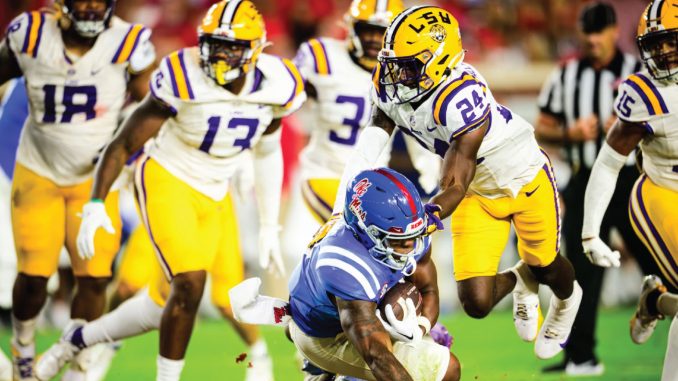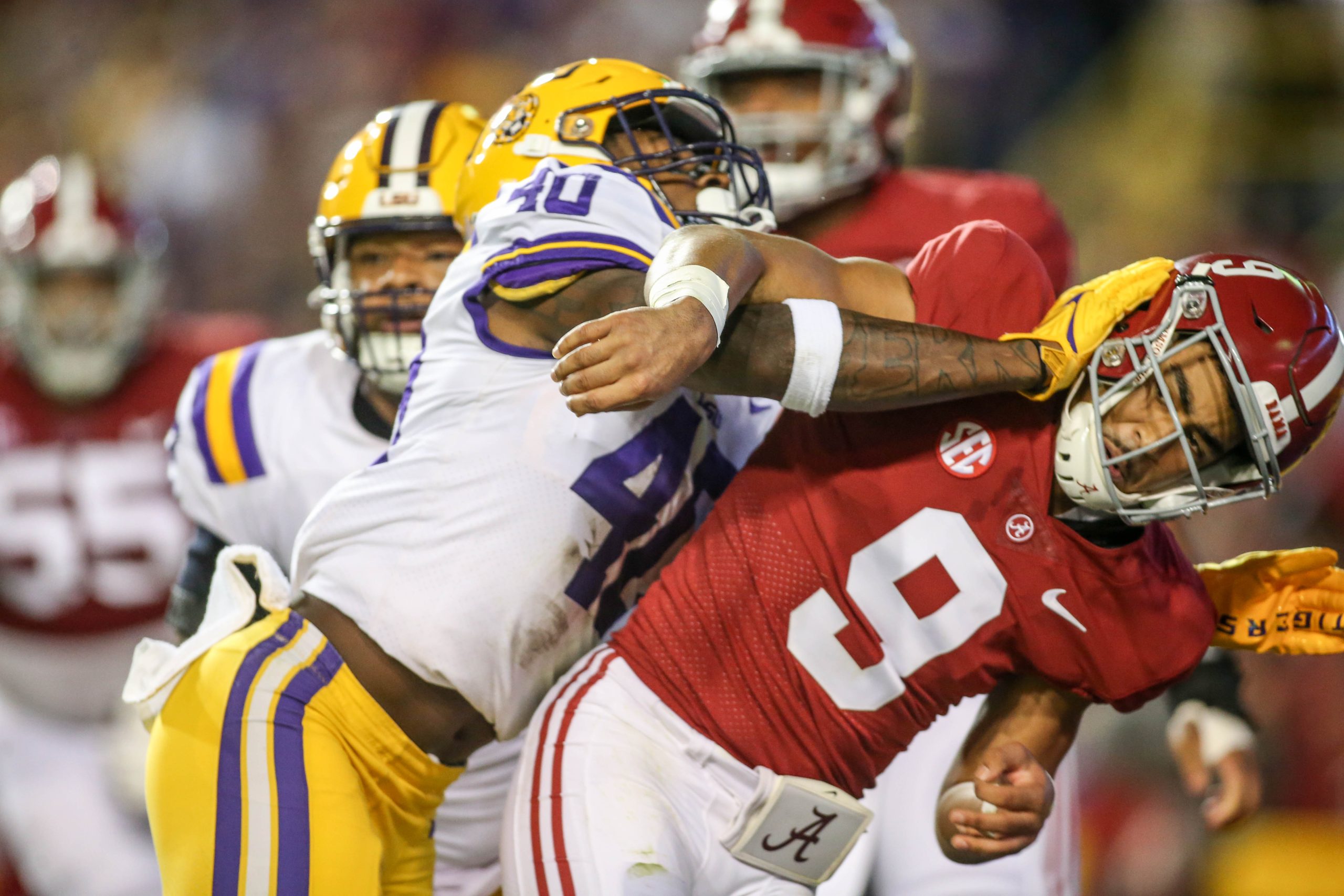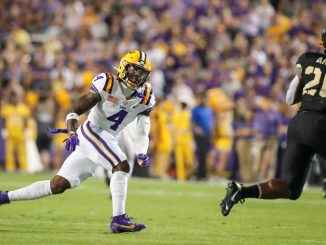
GLENN GUILBEAU, Tiger Rag Editor
Even if LSU had beaten Ole Miss last season, 56-55, coach Brian Kelly would not want that type of game again or then.
Kelly and the Tigers lost that game, 55-49, in an offensive showcase for the ages in Oxford that saw 1,343 combined yards and 14 touchdowns. In the end, Ole Miss’ defense made two key stops and scored two touchdowns in the final five minutes to erase a 49-40 deficit on drives of 65 and 88 yards for the win. The Tigers allowed a school-record 706 yards.
The loss knocked LSU out of the former four-team College Football Playoff as it fell to 3-2 on the season and 10 spots in the Associated Press poll to No. 23 in the country. The Rebels finished 11-2. No. 13 LSU (4-1, 1-0 Southeastern Conference) hosts No. 9 Ole Miss (5-1, 1-1 SEC) on Saturday night in Tiger Stadium (6:30 p.m., ABC).
“If you’re asking the question relative to how it fits? Each and every week, we don’t want it to be a shootout,” Kelly said Monday at his weekly press conference. “We want to play the appropriate level of defense that allows us to run our offense that protects (the defense) and plays complementary football.”
LSU’s defense last season was not even appropriate enough to help get the nation’s best offense and one of the best quarterbacks ever into the postseason. The Tigers’ defense finished 115th out of 130 upper level programs against the pass at 255.6 yards a game. LSU was 105th in total defense with 416.6 yards a game given up. The Tigers’ offense, meanwhile, finished No. 1 in the nation in yards per game with 543.5, and quarterback Jayden Daniels won the Heisman Trophy with 3,812 passing yards and 1,134 on the ground.
But LSU finished the regular season 9-3.
“Last year, clearly, we were tilted one side,” Kelly said. “And we had to play, unfortunately, the game that way. I didn’t like it, but that’s what we had. We were in a situation where we were trying to outscore people, and that was not the right way to play. It was the only way to play.”
When Kelly hired defensive line coaching whisperer Pete Jenkins as an analyst after the Ole Miss disaster, he told him, “We just need one or two stops a game.”
LSU went 7-1 the rest of the way with Jenkins assisting, but still allowing 32 points a game over that span to SEC teams and Wisconsin in the 35-31 ReliaQuest Bowl win. Kelly fired defensive coordinator Matt House and the rest of the defensive staff. He replaced him with rising Missouri defensive coordinator Blake Baker and added veteran defensive line coach Bo Davis from that job at Texas, Baker’s edge rusher coach at Missouri in Kevin Peoples, veteran secondary coach Corey Raymond from Florida and LSU prior to that, and safeties coach Jake Olsen, who coached linebackers at Missouri under Baker.
The Tigers are just now entering the meat of their schedule, but so far so good. LSU’s total defense is 63 yards better than last year and 39 spots better in the nation at 66. The rush defense is virtually twice better than it was a year ago as far as the rankings at No. 43 with 117.2 yards allowed a game to No. 85 and 161 yards a game. The scoring defense is allowing a touchdown less a game at 21.6 for 48th nationally after a No. 78 finish a year ago. The pass defense is still struggling at No. 93 nationally, but it has allowed nearly 20 fewer yards a game at 236.
So, the “tilted” LSU has tilted back toward the center.
“I think there’s much more balance in our football team,” Kelly said. “We want to play good defense. Want to keep the points down, and we want to score appropriately. Players certainly would say from a coaching standpoint and a playing standpoint, we’re much further along. That’s not the same defense.”
LSU and its fans will find out if that is true very quickly, because Ole Miss is the same devastating offense. Coach Lane Kiffin’s Rebels are No. 2 in the nation in total offense with 560 yards a game, and quarterback Jaxson Dart is No. 3 in the nation in efficiency at 193.0 on 127-of-173 passing for 2,000 yards and 13 touchdowns with two interceptions. Ole Miss also still plays complementary football as it is No. 3 nationally in scoring defense with 7.5 points allowed.
“I want to play complementary football, where our offense complements our defense and vice versa,” Kelly said. “And that’s really what we’re looking to do here at LSU.”
Complementary football means keeping the ball away from the other team. Ole Miss had it for 30:43 in the last game to LSU’s 29:17. LSU was a stop and a minute away.
“If you can keep Jaxson Dart and that offense off the field, that is definitely part of the success that teams can and will have against an outstanding scheme and a great play caller (Kiffin),” Kelly said. “Lane and Charlie (Weis, Jr., the offensive coordinator) do a great job, and they work together. They’re really sound and fundamental, and they take advantage of what you’re doing. So, if you can win that game of possession time, you are at a clear advantage.”
Shaving those 706 total yards to something in the 500s would help, too.
“When you’re playing an up-tempo team like Ole Miss, you’ve got to tackle,” Kelly said. “Didn’t tackle very well last year. Didn’t get lined up and didn’t play fundamentally sound football. It starts with that premise.”
All Kelly had to do to remind himself of that was to watch that 55-49 loss again.
“Oh, goodness,” he said. “OK, that’s not what we want to be defensively. We’re trying to do too many things. We don’t want to play that way.”




Be the first to comment